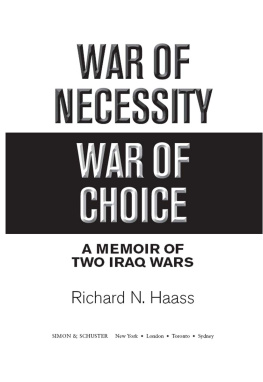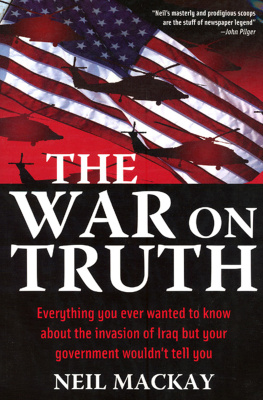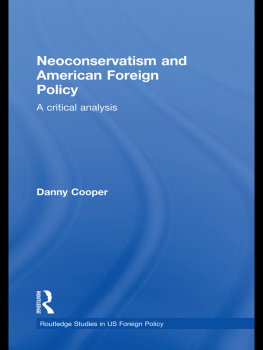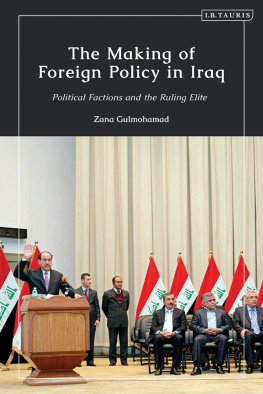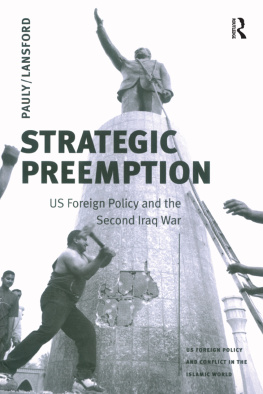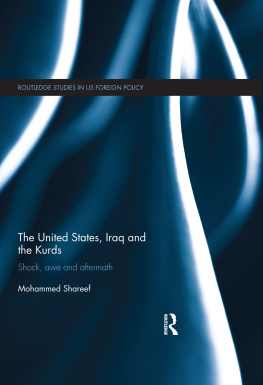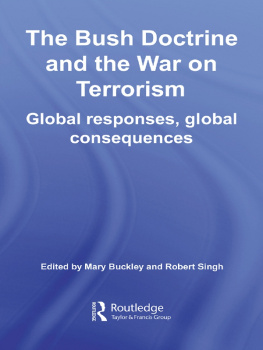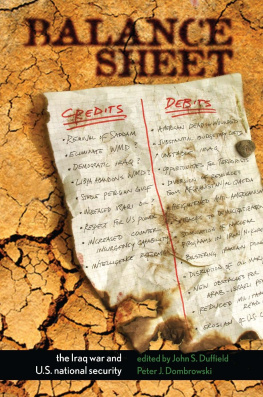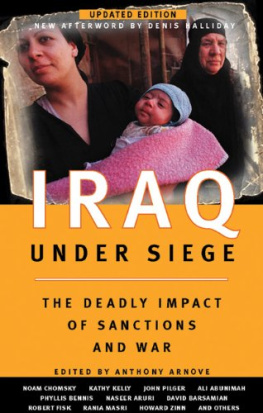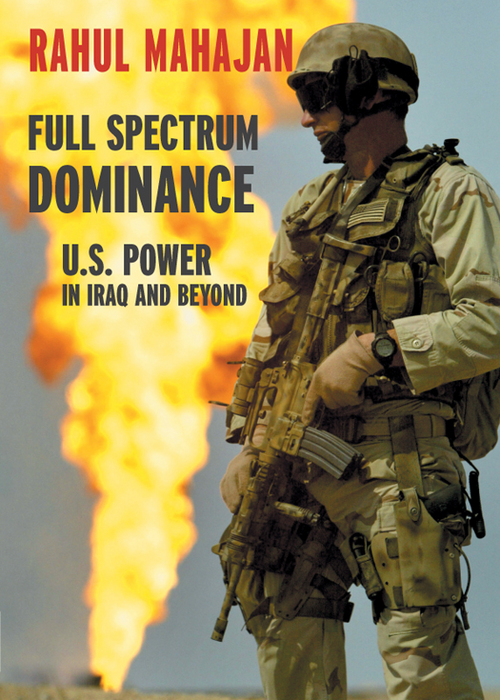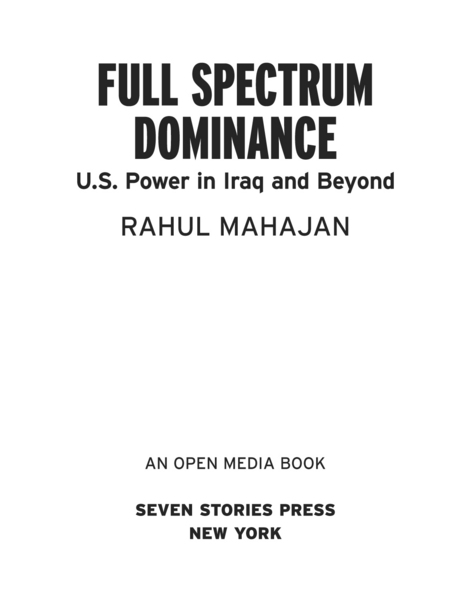2003 Rahul Mahajan
All rights reserved. No part of this book may be reproduced, stored in a retrieval system, or transmitted in any form, by any means, including mechanical, electric, photocopying, recording or otherwise, without the prior written permission of the publisher.
Cover design: Greg Ruggiero
Cover image: March 23, 2003, a U.S. soldier from the 1st Marine Expeditionary Force stands near a burning oil well in Iraqs Rumayla oil fieldsthe second largest offshore oilfield in the country. IAN WALDIE/GETTY IMAGES
Library of Congress Cataloging-in-Publication Data
Mahajan, Rahul.
Full spectrum dominance : U.S. power in Iraq and beyond / Rahul Mahajan.-- 1st ed.
p. cm.
eISBN: 978-1-60980-221-9
1. War on Terrorism, 2001- 2. Sanctions (International law) 3. United StatesForeign relations. 4. DemocracyIraq. 5. Human rightsIraq. I. Title: U.S. power in Iraq and beyond. II. Title. HV6432 .M336 2003
956.70443--dc21 2003010279
v3.1
To the people of Iraq, who have suffered much, in hopes that one day they will achieve a genuine liberation. And to the global antiwar movement, that for one shining moment rocked the halls of power, and will do so again.
I would like to thank Zeynep Tufekci for helping me with this book and for a long and very fruitful political collaboration. Her influence shows up on every page.
Contents
The overall goal of the transformation described in this document is the creation of a force that is dominant across the full spectrum of military operationspersuasive in peace, decisive in war, preeminent in any form of conflict.
Full spectrum dominancethe ability of U.S. forces, operating unilaterally or in combination with multinational and interagency partners, to defeat any adversary and control any situation across the full range of military operations.
JOINT VISION 2020 , released May 30, 2000.
We dont seek empires. Were not imperialistic. We never have been. I cant imagine why youd even ask the question.
DEFENSE SECRETARY DONALD RUMSFELD , when asked by an al-Jazeera correspondent if the Bush administration was bent on empire-building. Press conference, April 28, 2003.
INTRODUCTION
After the War: U.S. Power in Iraq and Beyond
THE SHORT-TERM POLITICAL calculations of the Bush administration seem to have been borne out. Resolutely ignoring a tidal wave of domestic and international opposition, the administration gambled everything on the idea that nothing succeeds like success. The genuine joy that the Iraqis felt at the end of Saddam Husseins extremely brutal rule (and at the foreseen end of the crippling sanctions) has enabled the administration to claim that this was a war of liberation. The comparative restraint with which the war was waged (contrast with, say, the Gulf War, in which electrical power and other necessary civilian infrastructure was systematically bombed, and in which helpless soldiers were slaughtered by the tens of thousands, mercilessly bombed on the Highway of Death or buried in the sands of southern Iraq) has led to an outpouring of what can only be called imperialist triumphalism.
Even though thousands of soldiers and civilians were slaughtered, maimed, and injured by the war, it did not prove difficult to argue that this was a small price to pay for the fact that Iraqis will in many ways be far better off with the end of Hussein and the lifting of U.S.-imposed sanctions. It was easy to forget during this orgy of self-congratulation that the three-week shooting war was simply the culmination of a 13-year war, waged primarily by the United States, against the people of Iraq. The Gulf War and the sanctions likely killed over 1 million people and led to a large-scale breakdown of Iraqi society. It was even easier to forget the fact that Iraq had not used any weapons of mass destruction (a term that is applied equally to the very real thermonuclear bombs of the United States and to the hypothesized Iraqi mustard-filled artillery shells)and that, therefore, the claims that Iraq posed some threat to the United States that had to be pre-empted were absurd. If, after all, Saddam Husseins regime was either unable or unwilling to use the dreaded WMD to save his own rulethe ultimate threatwhat would be the circumstances in which he would use them? What possible threat to the worlds superpower is posed by a country unable to fly a single plane against an occupying force?
The war was an integral, and perhaps the primary, component in a sweeping new vision of U.S. foreign policy associated with a group of ideologues who call themselves neoconservatives and who have emerged as the dominant influence in this administration. Although the roots of virtually every neoconservative idea can be discerned in the policies of the 1990s, this is the first time in the postCold War era that their vision of using direct military means to extend the dominance of the United States has become the central approach.
In particular, the war dramatically increased the United States long-term capacity for force projection, not just in the Middle East but, dovetailing with other developments, potentially in the world as well.
U.S. PLANS FOR IRAQ
In a sense, had there been any doubt about U.S. intentions for Iraq, it should have been dispelled when Deputy Defense Secretary Paul Wolfowitz rediscovered the doctrine of odious debt.
This doctrine was first used in 1898, after the Spanish-American War. The United States had liberated Cuba and decided to own it. The most blatant expression of the ownership was the Platt Amendment to the Cuban constitution that gave the United States the right to intervene in Cuba whenever it wished. When Spain pressed for repayment of Cubas debt to Spain, the United States argued that the debt was invalid because it had been imposed upon the people of Cuba without their consent and by force of arms.
This basic idea, that debts incurred by an unrepresentative regime need not be repaid by the people, has become part of customary international law and is one He did not, however, comment on how this would apply to the debt of the Congo, run up by the kleptocratic U.S.-supported dictator Mobutu Sese Seko, or, even more fitting, to the debt incurred by the apartheid regime of South Africa, long a close strategic ally of the United States.
Things are very different now than they were with Cuba. Almost immediately after liberating Iraq, the United States announced its intention to establish four military bases in Iraq, with one official saying, There will be some kind of a long-term defense relationship with a new Iraq, similar to Afghanistan. Although the report was contested by Defense Secretary Rumsfeld in one of his trademark convoluted semi-denials, the United States has left little doubt that a continued military presence in Iraq is the key component of its plans to transform the Middle East.
OIL
U.S. plans for Iraqs oil are similarly clear. Iraq was the first Arab country to fully nationalize its oil, in 1972. In the 1990s, like other OPEC countries (especially Iran), most of which suffer from the endemic capital shortages of Third World countries, it began looking to foreign investment to finance new exploration. Although no agreements could be implemented under the sanctions, Iraq signed deals with the oil companies of practically any country that wasnt the United States or the United Kingdom, since they were viewed as the major protagonists of the sanctionsin particular, major exploration agreements were signed with Russian and French companies.


